 ISTOCK, JAMIELAWTONFor more than 10 years, Mustafa al’Absi, a behavioral scientist at the University of Minnesota, has been collaborating with researchers in Yemen to study the neurological and behavioral effects of chewing a psychostimulant plant called khat. But the collaboration faced challenges in recent years due to the tenuous security situation in Yemen. And following Trump’s executive order limiting immigration from Yemen and five other countries with predominately Muslim populations, al’Absi decided to put the project on hold completely to avoid burdening his colleagues with concern over travel.
ISTOCK, JAMIELAWTONFor more than 10 years, Mustafa al’Absi, a behavioral scientist at the University of Minnesota, has been collaborating with researchers in Yemen to study the neurological and behavioral effects of chewing a psychostimulant plant called khat. But the collaboration faced challenges in recent years due to the tenuous security situation in Yemen. And following Trump’s executive order limiting immigration from Yemen and five other countries with predominately Muslim populations, al’Absi decided to put the project on hold completely to avoid burdening his colleagues with concern over travel.
“The conversation has been a bit toxic when it comes to welcoming or not welcoming scientists from abroad . . . not just in regions that have been affected by these policies,” al’Absi explains. “It’s a difficult situation, even without thinking about specific policies or specific enactment of policies. I always am concerned about perception because that’s what drives people.”
And al’Absi isn’t alone. In an age of shifting political climates—namely, Brexit and policies such as US President Donald Trump’s executive order on immigration—many researchers are rethinking how they approach international collaborations, as uncertainty abounds about the effects of limiting scientists’ global mobility.
Issues of travel, funding, and collaboration “are closely linked in people’s minds,” says Andrew Rosenberg, a marine scientist and the director of ...













